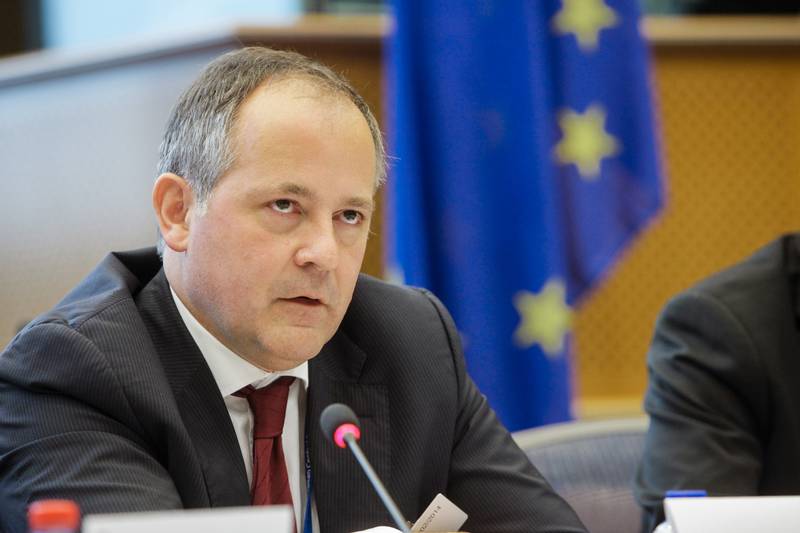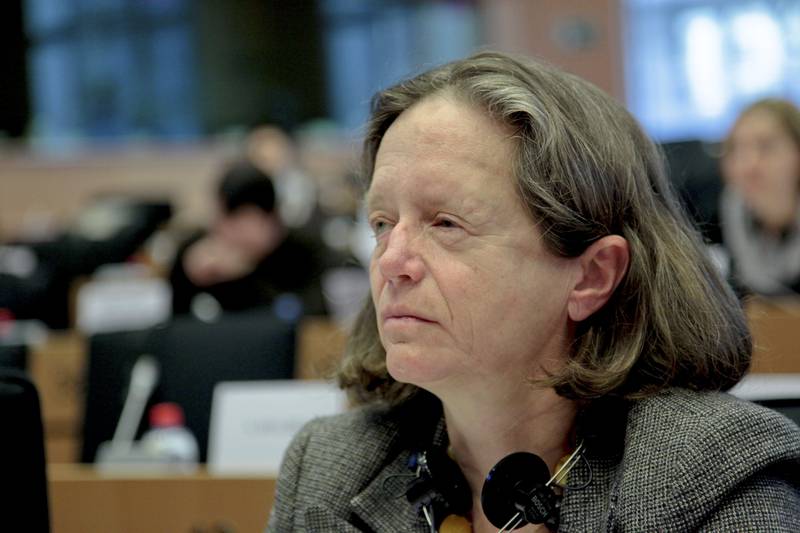It Is Too Early for a Euro Area Budget
Adelina Marini, March 6, 2016
 The drama, surrounding the British question returned once more the talk about an increase of euro area integration back on the agenda – a conversation that has been going on mostly on a theoretical level after the presentation of the second roadmap for deepening of integration within the Economic and Monetary Union (EMU) last June. At the moment, work is in progress on the first stage in the two-stage program, drafted by the five presidents in the EU – of the EC, the European Council, the Eurogroup, ECB, and the European Parliament – the so called five presidents’ report. The second stage, however, is the one to shift integration in the currency club into higher gear, for it envisages changes that require opening of the founding treaties for deep amendments. Whether this will be possible, having in mind the concessions granted to Great Britain is a question that is out of the agenda until the 23 June referendum.
The drama, surrounding the British question returned once more the talk about an increase of euro area integration back on the agenda – a conversation that has been going on mostly on a theoretical level after the presentation of the second roadmap for deepening of integration within the Economic and Monetary Union (EMU) last June. At the moment, work is in progress on the first stage in the two-stage program, drafted by the five presidents in the EU – of the EC, the European Council, the Eurogroup, ECB, and the European Parliament – the so called five presidents’ report. The second stage, however, is the one to shift integration in the currency club into higher gear, for it envisages changes that require opening of the founding treaties for deep amendments. Whether this will be possible, having in mind the concessions granted to Great Britain is a question that is out of the agenda until the 23 June referendum.
One of the largest integration steps envisaged in the second stage is the creation of something like a unified euro area budget. Its outlines are too unclear in the five presidents’ report, so, at the moment, discussions are purely theoretical and hypothetical. The document talks about the creation of a “fiscal stabilisation function for the euro area”, whose aim will be to mitigate large macroeconomic shocks. What this function will look like will be decided by a special expert group, which will start work on it. The presidents’ report just gives guidelines, or rather says what the future “function” should not be doing.
It should not lead to permanent and, most of all, one-way transfers between member states; should not be seen as a tool for levelling of wages between member states; definitely should not undermine the motivation for keeping a good fiscal policy, neither should it discourage the leading of structural reforms. Besides, the future “budget” should not be used for crisis management either. It is said that the euro area’s permanent bailout fund has already taken up this function. In other words, the five presidents see no option for the fund in question to lay the foundations for the future budget.
The explanation what the future function should not be only shows how far the euro area still is from such an integration step. The trouble is, however, that the situation in the currency club is not promising at all. Growth is unconvincing, for it is due to the generous monetary policy of the ECB and low oil prices. These two factors are not going to change soon, but there are already dark clouds gathering over the global economy, boding new troubles, which could affect the euro area’s recovery process. Benoit Coeuré, Member of the Executive Board of the ECB, warned that the euro area may not survive future economic shocks. He said so during a special hearing in the European Parliament, organised by the economic affairs committee and the budget committee. The subject was precisely a possible euro area budget.
Benoit Coeuré said that very few euro area countries had fiscal manoeuvring space if the risks to the recovery materialise. Everyone else has serious public finances problems. “We are all well aware that political attention is largely focused elsewhere, but we should not lose sight of the objective of completing Economic and Monetary Union (EMU), securing its capacity to absorb economic shocks and creating confidence today in its future economic performance”, he said in a speech, which is worth a careful read from beginning to end, for it provides not only a generous analysis of the current situation, but also a vision on what should be done in order to confidently push forward.
What the future budget should look like is a question of political decision, he said, but proposed some very important guidelines. First of all it is very important that euro area fiscal policies lead to macroeconomic stabilisation and a return of trust of financial markets in the stability of public finances. Especially today, this sounds like an anathema, for the refugee crisis served as a mighty catalyst to the return of the old resistance to the euro area’s rigid fiscal rules. A conversation, led once again by Italian PM Matteo Renzi. He is not, however, the only one demanding a loosening of belts, which have not been too tight everywhere anyway. Benoit Coeuré, however, warned that this is no longer about “theology” at all. “It is a political and economic imperative”. “Markets need to trust the capability of our governance framework to effectively coordinate fiscal policies in EMU, and citizens need to be confident that common rules are being respected”, he said in front of MEPs of the two committees in the evening of March 2nd.
The latter is very important, for an eventual future fiscal capacity (or budget) will be financed by current or future taxes, paid by the same taxpayers and companies, who are already financing their national budgets. Meaning the new “edifice” will not be stable if national budgets are not stable. Moving toward a stronger risk-sharing requires a reciprocal step towards common decision making with strong shared institutions. Access to the eurozone budget should be granted under strict conditions for following the fiscal rules, set out in the Stability and Growth Pact (SGP). The French member of the ECB repeated what many EU leaders keep replying to Matteo Renzi,  when he starts demanding more flexibility – the pact already contains enough flexibility.
when he starts demanding more flexibility – the pact already contains enough flexibility.
There is another very important thing that Mr Coeuré said to MEPs – fiscal risks do not necessarily originate from fiscal actions, but from unsustainable economic and finance policies. This is why steps should be made towards a new process of convergence, including political convergence. The boss of the Dutch central bank, Klaas Knot, who also participated in the discussion, shares the view that the reason for the crisis is not always fiscal policies. The most affected by the crisis euro area countries – Greece, Portugal, Ireland, and Spain – owe it to not sufficient budget discipline before the crisis. Another reason are the serious macroeconomic balances, piled up during the years. This is why fiscal consolidation was inevitable in the long run, he said. This is exactly the reason why creating a budget stabilisation fund (which is another name of a potential euro area budget) will be much more difficult to achieve in practise, than it looks like in theory.
According to Klaas Knot, the challenges the future budget faces are several, and one of them is having it be politically acceptable to member states. This could turn out to be crucial in the current political context in the EU, when the discussion of a specific legislative bill begins, if it does so at all any time soon. The Dutch central banker outlined four challenges that will be faced by the future euro area budget. The first one is that the type of asymmetric shocks that the euro area went through will be difficult to effectively stabilise with a limited fiscal capacity. In other words, size does matter, and this is the point where comparisons were made with the common European budget, which is around 1% of the EU’s gross national income. Another problem is that stabilisation funds are inherently aimed at the business cycle, which usually lasts around 8 years. This is quite a limited period of time, meaning contributions to the future fund should be temporary. Business cycles in the euro area have generally been well synchronised since the introduction of the euro, unlike financial cycles, which are longer as well – 16-20 years.
Besides, differences within the euro area are still sizable regarding competitiveness, the current account, the growth of credits and real estate prices. So, if a future budget is only aimed at business cycles it will only be able to stabilise just a small part of the financial cycle. If, however, the budget is aimed at financial cycles it would lead to very prolonged transfers. Something, which member states are not ready to accept at the moment, said also Mr Knot. Another challenge is that an euro area fiscal capacity will surely affect national fiscal policies. It may even lead to an increase of taxes. Just like Benoit Coeuré, Klaas Knot reminded that taxpayers were the same people, both at the national and at euro area level. “We cannot levy tax on aliens from outer space unfortunately”, he joked, but no one in the room found it funny.
The problem could exacerbate if this fund, budget, or capacity is allowed to borrow. This means it could affect the implementation of the Stability and Growth Pact. So, if such a step is taken, this should necessarily go hand in hand with a very strict implementation of fiscal rules, heavily focusing on debt levels. The third challenge is that such a fund could increase the sharing of public risk. It has grown significantly over the last years through the mechanisms of the euro area’s bailout fund. The problem is that member states still differ too much not only with regard to debt and current account, but also to their adaptability when the word is about competitiveness and the not insignificant quality of institutions.
Klaas Knot shares the view that we have heard many times from the Eurogroup boss – Dutch Finance Minister Jeroen Dijsselbloem – namely that stabilisation could also be achieved by private risk sharing. He quoted a “well known study”, which says that private risk-sharing through integrated financial markets has a much greater stabilising effect – around 62%, than public risk-sharing through the federal budget, whose effect is around 13%. The problem with private risk-sharing is that the European market is underdeveloped. The building of a capital markets union is an “excellent starting point” for that, believes The Netherlands’ central banker.
It also became clear from the discussion with MEPs that economic convergence, the strict adherence to the agreed rules, and placing decision-making out on an supranational level are the most important prerequisites for a possible euro area budget having sense. It is of not less importance that whatever is done should be done with the community method and step-by-step, although some MEPs feel there is no time for that. There may be no time, but the political and economic environment allows nothing else. The first step should be a rebuilding of trust. According to Klaas Knot, however, this will be difficult, having in mind that the implementation of country-specific recommendations on the European semester is extremely slow. “The construction of the rules is different than enforcement. And as long as the rules are there on paper, but they do not get sufficiently followed up  on the ground, then I think there will be difficulty in also building enough trust”, said the boss of the Dutch central bank.
on the ground, then I think there will be difficulty in also building enough trust”, said the boss of the Dutch central bank.
The most important conclusion from the discussion was the one of Benoit Coeuré, according to whom, a great role in the current uncertainty of investors is the uncertainty about the euro area’s future as well as how will it absorb shocks. Thus, he recommended, a clear roadmap should be drawn, which in itself will lower uncertainty considerably and lead to growth. Another conclusion of the March 2nd discussion is that the postponement of solving euro area problems will not lead to a more successful solving of the refugee crisis and success in the fight against terrorism. “If downside risks to the recovery were to materialise, this would not make it easier to respond to the refugee crisis or to counter terrorism”, said Benoit Coeuré. The large hindrance to euro area integration, however, is not just that everyone is fully absorbed in solving the migrant crisis, but also the coming referendum in Great Britain. It will be crucial to the currency club’s future.
Translated by Stanimir Stoev
 Angela Merkel, Emmanuel Macron | © Council of the EU
Angela Merkel, Emmanuel Macron | © Council of the EU Benoit Coeure | © Council of the EU
Benoit Coeure | © Council of the EU Pierre Moscovici | © Council of the EU
Pierre Moscovici | © Council of the EU